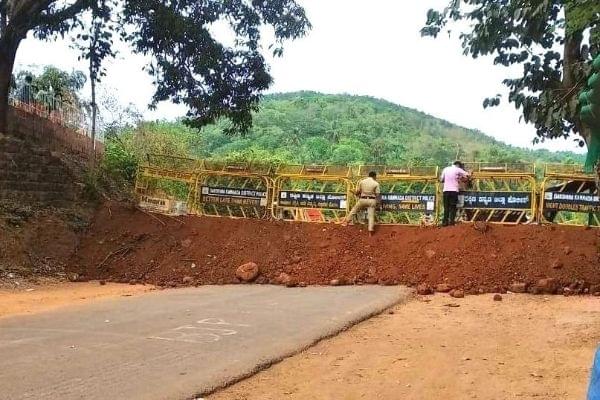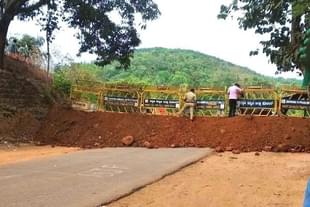News Brief
Karnataka Kerala Border Sees Protests After Dakshina Kannada Tightens Border Guard To Prevent Hike In Covid Cases
Swarajya Staff
Aug 03, 2021, 07:07 PM | Updated 07:10 PM IST
Save & read from anywhere!
Bookmark stories for easy access on any device or the Swarajya app.


Three days after Karnataka imposed a fresh set of guidelines for Covid management in the state, protests were reported at the state's border at Talapady, with regular commuters objecting to the strict regulations in place.
While the protestors have been seeking a relaxation of restrictions for those who received both doses of the vaccine, Karnataka isn't game to take any chances as the coastal district saw a hike in cases in the last week.
Karnataka has been witnessing a spike in its Covid cases in the last one week after the relaxation of lockdown, especially in its coastal districts of Dakshina Kannada and Udupi and capital city Bengaluru.
As per reports, the district positivity rate in Dakshina Kannada jumped from 3.05 per cent to 6.04 per cent in the last fortnight. The city even beat the capital city earlier this week, with Dakshina Kannada reporting 410 cases and Bengaluru saw 409. While the district was seeing a downward trend until the last week of July, it has seen a spike post 25 July.
The numbers stood at a total of 4,789 cases between 15 July to 1 August, but the last five days of the month saw 1,853 cases and 33 fatalities, as reported.
While this is on the one hand being accorded to the relaxation of norms that saw people visiting temples and beaches with a visibly reduced sense of caution and safety measures, the district has closed its borders to neighbouring Kerala, which is also being held responsible for this sudden spike, especially in the last five days.
Among the top 20 towns of the state with high coved infection numbers, most share borders with Kerala, be it Sullia, Puttur, Bantwal, Kotekar in Dakshina Kannada or Kushal Nagar and Madikeri in Kodagu. District administration of Kodagu has ordered a ban on the sale of liquor in villages that share a border with Kerala. Liquor sale has been prohibited within a 5 km radius of the border at all outlets, restaurants, hotels and bars. People from Kerala are said to travel to the villages of Kutta, Karike, among others, to buy liquor which is banned in their state and hence this move, say authorities, to prevent a spike in cases owing to travellers.
The neighbouring state saw a spike in cases after a relaxation of norms around the Eid weekend. This led to Karnataka closing its borders yet again with strict rules imposed for people entering Karnataka from Kerala. Protests have also been reported at Talapady, the border region between Kasaragod and Dakshina Kannada, as authorities have now mandated negative RT-PCR reports even for those vaccinated.
With fears of a third wave affecting the state and the continuous rise in numbers in Kerala and Maharashtra, both of which led the past two waves, the Karnataka order mandated that all passengers furnish a negative RT-PCR report not older than 72 hours for all entering the state by flight, train, taxi as well as personal transport.
The state also instructed airlines to provide boarding passes and railway authorities to permit travel to only those passengers who carry a similar report. It also instructed district authorities to deploy staff at check posts to ensure the vehicles are compulsorily checked for compliance with the above.
The special surveillance measures allowed only those passengers possessing vaccination certificates of having received both the doses of Covid 19 vaccine, healthcare professionals and constitutional functionaries, children below two years of age and in the case of emergencies.
And in a repeat of what had happened the last time around the state shut its borders, frequent travellers led by activists of the UDF and LDF protested today against this restriction of movement, which saw hundreds of travellers being sent back from the borders.
But the state has no intentions of providing any relaxation whatsoever. As per the latest reports, Karnataka ADGP CH Pratap Reddy, who visited the border today (3 August), said that these rules would stay until the positivity rate in Kerala reduces to normal levels. "Only those travelling for emergency purposes and students appearing for the examinations are exempted. Students who don't have hall tickets can use their ID cards. These restrictions will continue until the positivity rate comes down to normal levels in Kerala," said Reddy, as quoted.
Both states have been plying their state transport buses only upto their respective borders for the past one week, with passengers required to cross over and continue travel after providing required documents.





